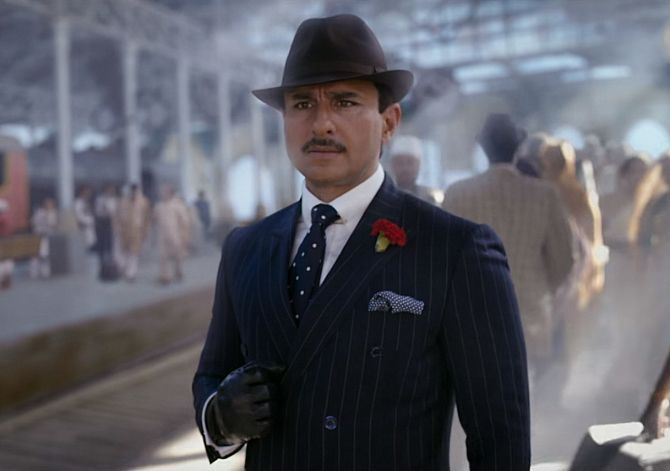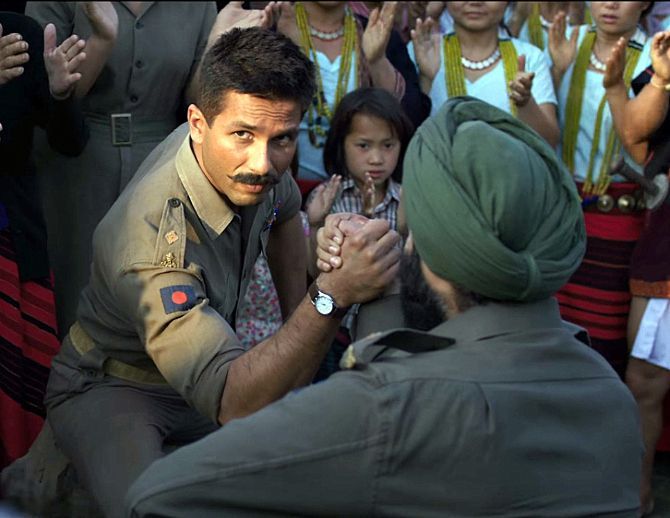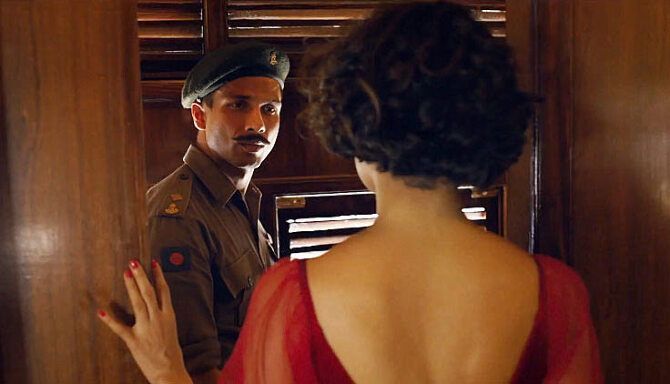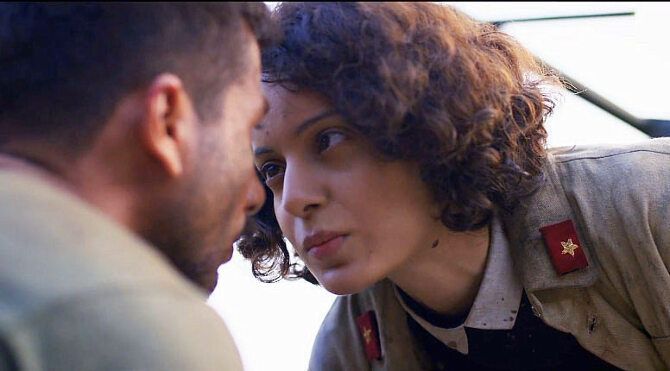Did the human drama provoked by the Japanese invasion of Burma and the Indian exodus from Rangoon inspire director Vishal Bhardwaj's forthcoming epic?

'A love triangle forms against the backdrop of the Second World War.'
That's all imdb.com says about the plot for Vishal Bhardwaj's Rangoon, which releases on February 24.
Rangoon's trailer is mysterious about the film's time frame.
Is it set before the Japanese invaded Burma in 1941-1942?
Or during the bloody battle the British army waged to evict the Japanese from Burma after halting the Japanese army's relentless march towards India?
'Rangoon was predominantly an 'Indian' city in that the majority of its population consisted of people of subcontinental origin or descent,' Amitav Ghosh, one of India's finest novelists, wrote on his blog soon after the publication of his elegant novel The Glass Palace.
'According to the 1931 census, there were slightly more than a million Indians in Burma at the time; of these some sixty per cent (617,521) were born in India,' Ghosh added.
'Through the 1920s and 30s,' Ghosh noted, 'there were some powerful currents of hostility to the Indian presence in Burma. In 1930 bloody anti-Indian riots broke out in Rangoon and many thousands were killed. As a result of these developments, there was an increasing nervousness within the Indian population in Burma.'
Japanese planes strafed Rangoon on December 23, 1941, 16 days after they had bombed Pearl Harbour in Hawaii and drawn America into World War II.
The fear of a Japanese military invasion triggered an Indian exodus.
'The Indians began to stream out of Rangoon and central Burma, and soon vast crowds clogged the principal roads,' Ghosh wrote.
'As to why so many Indians took the decision to leave Burma, at such great personal cost -- this remains something of a mystery to this day,' the novelist added.
It is likely that Vishal Bhardwaj set his film against the backdrop of this human drama.
- Must Read: Amitav Ghosh: An Exodus from Burma (external link)
- Amitav Ghosh: Exodus from Burma, 1941-42; a Memoir by Captain Nadir S Tyabji (external link)
In his account, 'Barefoot from Burma to India, 1942,' Benegal Dinker Rao -- 'born in 1917 in Rangoon, graduated from the university of Rangoon in 1938, and joined the education ministry, government of Burma. After his walk from Burma to India in 1942, he joined the refugee government of Burma in Simla' -- wrote, 'By mid-January 1942, the Japanese were bombing Rangoon night and day. Food became scarce; law and order broke down...'
'Soon we were forced to live in the trench as the bombings increased in frequency and intensity. During one air raid, when I was out in the open, en route to an air raid shelter, a bomb landed a few yards away from me,' Mr Rao recalled.
'I threw myself flat on the ground and thought it was the end. But the bomb did not explode -- there was just a huge crater where it had landed.'
'On April 21, 1942, Mainmath ( a friend of his) and I started our trek from Maymyo to India. The distance is about 520 km (320 miles) as the crow flies -- and much more than this on the ground. We did it in 34 days by whatever means we could get hold of -- walking, by raft, and an occasional lift from someone in a motor vehicle,' Mr Rao remembered many years later.
- Barefoot from Burma to India, 1942(external link)

We know from his interviews that Shahid Kapoor plays a soldier in the British Indian Army (we hope the director persuaded his famously opinionated star to trim his locks to military length; Sasha, by the way, has compared his relationship with Bhardwaj to the one Leo De Caprio has with Marty Scorsese).
In early 1942, the Japanese army began to advance through Burma. That perilously poor country was collateral damage.
The Japanese were, like empires before it, interested in just one thing -- the jewel in the British crown.
India.
The poorly prepared and equipped British army was vanquished in skirmish after skirmish, battle after battle.
When 'troops of the 17th Indian Infantry Division tried to retreat over the Sittaung river,' Wikipedia notes, the Japanese 'reached the vital bridge before they did. On 22 February, the bridge was demolished to prevent its capture.'
'The loss of two brigades of the 17th Indian division,' Wikipedia says, 'meant that Rangoon could not be defended. General Archibald Wavell, the commander-in-chief of the American-British-Dutch-Australian Command, nevertheless ordered Rangoon to be held as he was expecting substantial reinforcements from the Middle East.'
'Although some units arrived, counterattacks failed and the new commander of the Burma Army (General Harold Alexander) ordered the city (Rangoon) to be evacuated on 7 March after its port and oil refinery had been destroyed.'
It's a fair guess that Rangoon's climax has been set during the fall of Rangoon.
Its credits include Japanese actor Satoru Kawaguchi who plays a 'Japanese soldier' (does he kill one of Bhardwaj's male leads, so the other one gets the girl?) and British actor Richard McCabe (Notting Hill, Master and Commander) playing a British major general named Harding.
The Japanese carnage in Burma and elsewhere in Asia has been powerfully documented many times on film -- notably by David Lean in his 1957 classic, Bridge on the River Kwai about an honourable British colonel (Alex Guinness in an Oscar-winning role) building a bridge as ordered by his brutal Japanese counterpart, unaware that the Allies plan to bomb it out of existence.
Bridge on the River Kwai won seven Oscars -- Best Picture, Best Director, Best Actor, Best Adapted Screenplay, Best Music, Best Editing, Best Cinematography.
Sessue Hayakawa, who played the vicious Colonel Saito, was nominated for Best Supporting Actor, but lost out to Red Buttons playing Airman Joe Kelly in Joshua Logan's Sayonara.
Apart from Bridge on the River Kwai, we'd recommend Japanese master Nagisa Oshima's powerful Merry Christmas Mr Lawrence about life in a Japanese prison of war camp, starring singer David Bowie, and The Railway Man, starring Colin Firth as 'a former British army officer, who was tormented as a prisoner of war at a Japanese labour camp during World War II, discovers that the man responsible for much of his treatment is still alive and sets out to confront him.'

It took the sturdy military genius of William Slim -- 'Uncle Bill' to his adoring troops -- to halt the Japanese advance into India.
'In 1944,' Wikipedia notes, 'the Japanese launched an invasion of India aimed at Imphal, hundreds of miles to the north. Slim airlifted two entire veteran divisions (5th & 7th Indian) from battle in the Arakan, straight into battle in the north.'
'Desperate defensive actions were fought at places such as Imphal, Sangshak and Kohima, while the RAF and USAAF kept the forces supplied from the air. While the Japanese were able to advance and encircle the formations of the 14th Army, they were unable to defeat those same forces or break out of the jungles along the Indian frontier.'
'The Japanese advance stalled. The Japanese, who had a contempt for British and Indian troops based on their performance in 1941-1942, refused to give up even after the monsoon started and large parts of their army were wrecked by conducting operations in impossible conditions.'
'As a result, their units took unsupportable casualties and were finally forced to retreat in total disorder in July 1944, leaving behind many dead from hunger and disease as well as their injured.'
'In 1945, Slim launched an offensive into Burma... After crossing the Irrawaddy the town of Meiktila was taken, followed by Burma's second city, Mandalay. Slim's plan was a masterpiece of operational art, and the capture of Meiktila left most of Japan's troops stranded in Burma without supplies.'
'Toward the end of the campaign, the army raced south to capture Rangoon before the start of the monsoon. Also assisting in the capture of Rangoon was the Anti-Fascist People's Freedom League led by Thakin Soe with Aung San (the future prime minister of Burma and Aung San Suu Kyi's father) as one of its military commanders.'
The Allied generals who fought in Europe -- Montgomery, Patton, Bradley, Eisenhower... -- won all the glory, but Bill Slim -- later Field Marshal William Slim -- is widely considered the greatest general of World War II.
In April 2011, five eminent military historians gathered in London to debate and decide who Britain's greatest general was.
In the reckoning were Oliver Cromwell, the Duke of Marlborough (Winston Churchill's ancestor), the Duke of Wellington (who defeated Napoleon at Waterloo), Field Marshal Haig and Field Marshal Slim.
Writing in The Daily Telegraph, General Lord Dannatt, Britain's chief of the general staff from 2006 to 2009, wrote, 'In the mid-1940s Slim had transformed a demoralised army into a winning one, he pitched his limited strength against his enemy's weakness and he sought to outmanoeuvre the Japanese at every opportunity.'
'Moreover, he had a personal style that was both understated and endearing. His quiet authority won the hearts of his soldiers. Slim may not have had the manpower and equipment that he would have liked; but he had the leadership, the intellect and the mature understanding of operational art to win in Burma and to inspire subsequent generations.'
'It is his legacy that is drawn on by today's commanders, fully justifying the accolade -- Britain's greatest general.

Interestingly, the soldier many Indians consider India's greatest general also fought in the Burma campaign -- S H F J Maneckshaw.
The young captain was badly wounded in battle and not expected to live, which is why he was accorded the rare distinction of being honoured for his bravery -- the Military Cross -- on the battlefield itself.
Also caught in the heat and dust of war was Netaji Subhas Chandra Bose's Indian National Army, and its adventures and exploits in Burma were captured by a young filmmaker named Kabir Khan in his documentary, The Forgotten Army.
- 'Netaji was like God'
- 'The INA had no illusions about capturing Delhi with just 50,000 badly equipped men against the mighty British'
Kabir Khan, of course, has moved on to blockbuster territory.
The documentary filmmaker of the 1990s is today's member of the elite 200 crore and counting club -- the director of hits like Bajrangi Bhaijaan and Ek Tha Tiger.











 © 2025
© 2025